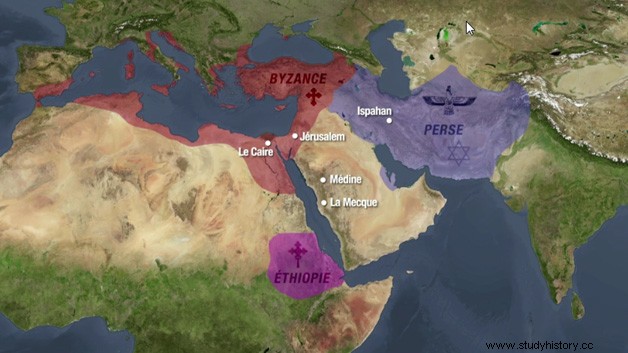
CIRCA 570:Life in Arabia before the founding of Islam (current Saudi Arabia)
Enclosed between the Red Sea, the Indian Ocean and the Persian Gulf, the Arabian Peninsula includes the “Happy Arabia “(Current Yemen), rich and fertile, and the Arabia of the deserts , a surly land, criss-crossed by Bedouins with their herds of goats and their camel caravans. At that time, before the founding of Islam, Arabia was going through a disastrous period and was largely devastated and ruined . She is prey to a certain anarchy and the existence of the Bedouins is very harsh. In times of scarcity, they practice the “razzia ” (from the Arabic word rhazya ) and plunder the other tribes. At that time, each individual belonged to a tribe which includes about ten clans . Each member enjoys the protection of their tribe.
Religion in Arabia, before the founding of Islam:
At that time in Arabia, there were Arabs polytheists , Jews , Christians , and each community practices its own religion by worshiping its own god(s). The Arabs, whether nomads or city dwellers, are in contact with 2 great Empires in decline:in the north , that of the Byzantines , where mainly Christians live , but also Jews and pagans , and east , that of the Persians, who practice Zoroastrianism (monotheistic religion).
Mecca:
Mecca is a small sacred city and a very important place of pilgrimage for the Arabs. It is located in the region of Hejaz , a mountainous region in western Arabia. Its main activity is organized around the caravan trade and services and it is one of the busiest towns on the peninsula. Indeed, it controls the trade route between Yemen and the Middle East. But the city remains nevertheless modest because the resources are limited there and the population suffers from starvation .
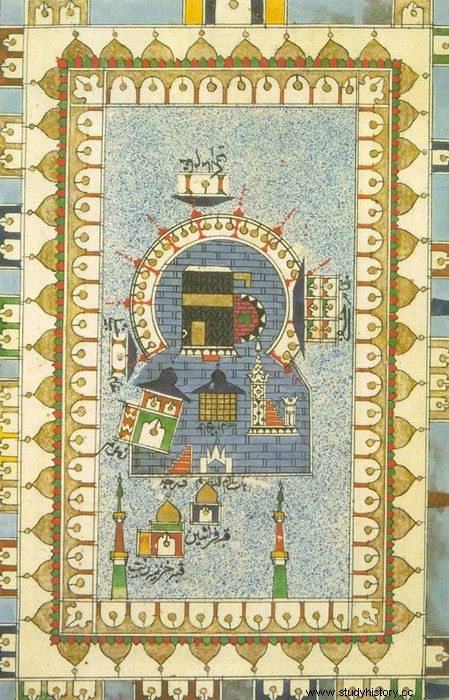
The Kaaba:
In Mecca , the majority of people are polytheists and superstitious. They fear the "jinns", diabolical spirits, and worship idols. They are very attached to their ancestral pantheon and make offerings to their deities . In the center of Makkah is the shrine of the Kaaba , gigantic cube of gray stone containing a basalt meteorite, the Black Stone. The inhabitants gather there deities in the form of idols and it is an important source of wealth, because it attracts many pilgrims from all over Hejaz.
Medina:
Medina is located 400 km north of Mecca and it is mainly Jews who live there. They exploit palm groves, are goldsmiths or traders. The majority practice Judaism , but some revere their own pantheon of ancestral gods. Some are descended from Hebrews who fled Palestine after the destruction of the second temple in Jerusalem by the Romans in 70 AD.
The Torah:
That they are Arabs polytheists , Jews or Christians , each community is an integral part of the Arab Society and shares the same reference to the Torah . The Torah, like the Gospels, is a rare and precious good that is transported through the deserts by caravans loaded with spices and fabrics from Byzantium, Persia or India. They are sacred books who speak of a unique god and powerful . The Jewish and Christian sacred texts carry a special aura, an almost magical power among polytheistic Arabs, the overwhelming majority of whom cannot read or write.
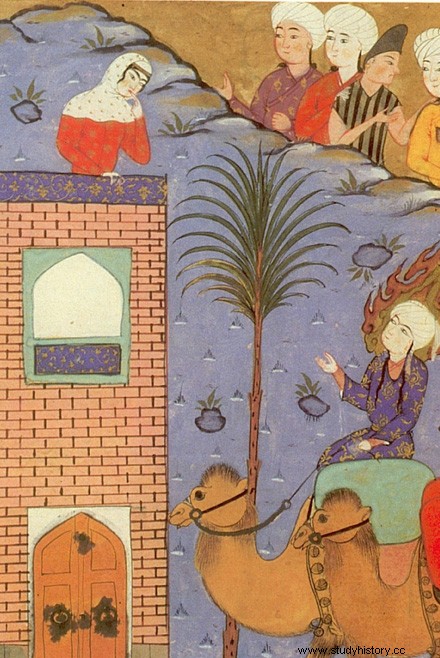
Birth of Muhammad:
Mohammed (or Muhammad, or Mahomet in French) was born in Mecca in the mighty polytheistic tribe of the Quraysh (“sharks” in Arabic). He had a painful childhood marked by poverty . He lost his father 2 months before his birth and his mother at the age of 6. Then he is cared for by his grandfather who falls ill 2 years later and dies. He was then taken in by his uncle Abu Talib. Mohammed cultivated during his childhood and youth a character and a moral force surprising. He has good manners, is honest, loyal and trustworthy. At the age of 12, Mohammed accompanied his uncle to Syria and met a monk there. who recognizes in him the distinctive signs of a prophet .
In 595:Muhammad marries a wealthy widow
After embracing a commercial career and accompanying caravans, particularly in Syria, Mohammed entered the service of a wealthy widow named Khadija , then 40 years old. Impressed by his intelligence and seduced by his beauty, she offers to marry him, despite being 15 years his senior. Mohammed is thus sheltered from material worries and sees himself socially recognized in Mecca. With his wife, he has 2 sons (who died in infancy) and 4 daughters.
CIRCA 611:Spiritual life of Muhammad and birth of Islam
Spirituality occupies a very important place in the life of Mohammed and at 40, despite having roots deeply polytheists , he undertakes to go in search of the unique God of whom the Torah and the Gospels speak. He regularly takes retreats in a cave on Mount Hira, a few km from the city, where he practices meditation . One day, he returns transformed and confides to his wife that the angel Gabriel appeared to him and gave him a divine message :Him, Mohammed is “the send of God”, “the prophet of Allah” and he must learn and recite the messages which are transmitted to him. The revelations multiplied and after a few years, supported and encouraged by Khadikja, Mohammed began his preaching . He forcefully proclaims the uniqueness of a one God , transcendent, almighty and merciful. He asserts that it is not he who speaks, that it is not his own thoughts and feelings, but an external force, God, which irrepressibly joins him. This is how the 3rd religion 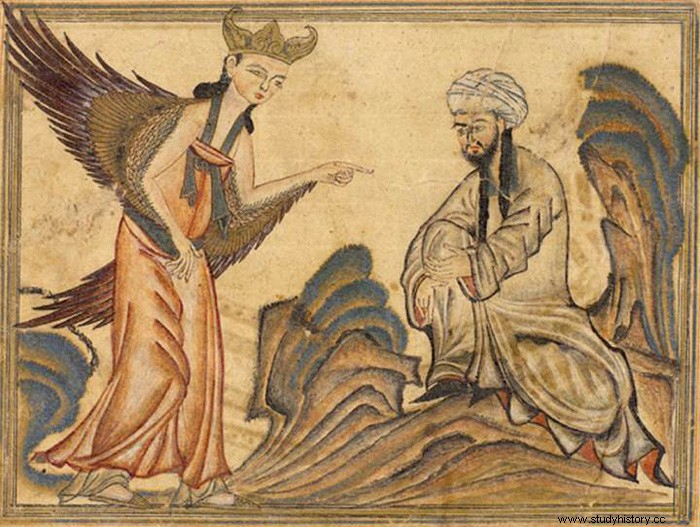 monotheist , Islam, which means “submission to the will of God”, begins to spread. A small group of believers gather around him, considering him the new prophet responsible for transmitting the divine word to men. A word enriched with references to Christianity , but especially to Judaism . There is already the ban on eating pork, prayer oriented towards Jerusalem and fasting, which demonstrate that the original Islam is mainly derived from Judaism. At that time, people wrote little but talked a lot. For many years the divine word of Muhammad was transmitted orally from one group of faithful to another, while travelers who came to listen to the sacred words, circulated the stories. This is how from verses to verses, from suras to suras, the word of Muhammad will give birth to the Koran (meaning “recitation”).
monotheist , Islam, which means “submission to the will of God”, begins to spread. A small group of believers gather around him, considering him the new prophet responsible for transmitting the divine word to men. A word enriched with references to Christianity , but especially to Judaism . There is already the ban on eating pork, prayer oriented towards Jerusalem and fasting, which demonstrate that the original Islam is mainly derived from Judaism. At that time, people wrote little but talked a lot. For many years the divine word of Muhammad was transmitted orally from one group of faithful to another, while travelers who came to listen to the sacred words, circulated the stories. This is how from verses to verses, from suras to suras, the word of Muhammad will give birth to the Koran (meaning “recitation”).
Religious conflicts break out:
In Mecca, the first Muslims are not very numerous, but this is enough to disturb the affairs of the polytheistic tribe of Quraysh, which manages the Kaaba. Even though Muhammad is a Quraysh like them, the chiefs of the tribe see him as a troublemaker who comes to competition to the Meccan polytheist. It also upsets their financial affairs and they fear being ruined because of the condemnation of the idols and the disappearance of the pilgrims to the kaaba. Abu Lahab, the new leader of the Hashemite clan, withdraws his protection from Muhammad, so that he can now be assassinated with impunity.
EN 619:Death of Khadidja
Mohammed remained faithful to his wife Khadidja for 23 years, despite the mockery and contempt of polygamous Arabs. After her death, he contracted simultaneously 11 marriages and takes 2 concubines . In most cases, these are political alliances , but Mohammed has a favorite wife, Aïcha, the daughter of his faithful adviser Abû Bakr. She was only ten years old when he married her, and it was on her breast that he rested his head at the time of his death.
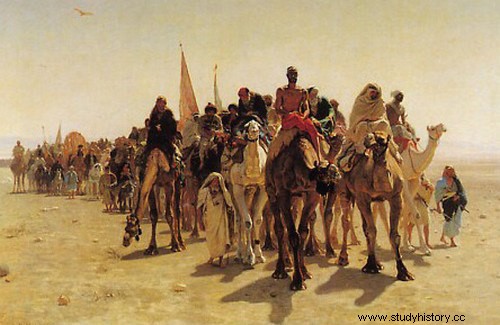
EN 622:Muhammad is banished from Mecca
The situation for Mohammed becomes untenable. He and his 75 faithful companions are banned from the city overnight, leaving behind most of their possessions. At that time, being banished from one's tribe and family was tantamount to losing one's identity. This terrible experience of loss and exile is founding for Mohammed to the point that this date of Hegira (“immigration” in Arabic), constitutes the beginning of the Muslim calendar . It is thus in the pain of banishment that the community of Muslim believers is born.
Mohammed and his followers arrive in Medina:
In Medina , Mohammed and his followers find themselves in contact with a strong Jewish presence whose 3 main tribes are the Banu Nadir , the Banu Qurayza and the Banu Qaynuqa . Mohamed thus came into direct contact with Judaism practitioners instead of the intellectual Judaism depicted in the books, accounts and stories he once had access to.
Religious differences between Muslims and Medinan Jews emerge:
In Medina , Muhammad expects the Jews to join him and recognize him as the new prophet sent by God. For him, his absolute monotheism is comparable to that of Judaism and he thinks that the Jews will join his community. As soon as he arrives, he gets closer to the rabbis of Medina and listens to the stories. He and the rabbis have a certain complicity because they all recognize a single god and they engage in theological debates passionate. But the Jews refuse to recognize Mohammed as the last prophet of God. They do not accept that the Koran can be there to correct the Jewish Bible and they do not want to hear about it. The Jews do not want to admit any new ideology and remain very attached to their ancestral traditions. They had already refused that Christians replace the old testament with the new. This shows already at that time, how men accepted or rejected a revelation or a difference .
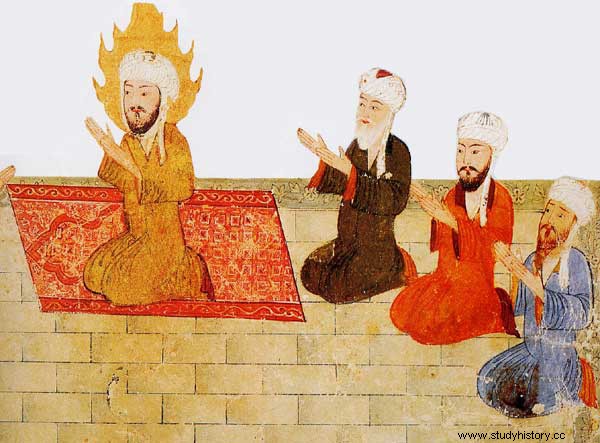
Medina is about to be attacked by the polytheists of Mecca:
In this troubled time, religious differences do not prevent alliances . Already a religious leader, Mohamed became a powerful political and military leader. He unites under his command the 3 Jewish tribes of Medina who line up behind the Muslim community. But this alliance is fragile because the Jewish tribes feel the progress of Islam as a danger . Indeed, the Muslim community is gradually replacing the contracts and alliances already established and the Jewish tribes feel threatened because they are losing their network of support and protection.
Mosques:
The first sanctuary Muslim, called “masjid” (place where one prostrates oneself) is built in Medina. Mosques are magnificent buildings in which Muslims pray. From the top of a minaret (a tower), a man, the muezzin , calls them to prayer . The pictures which represent animals or men are prohibited in mosques. Instead, they are decorated with mosaics.
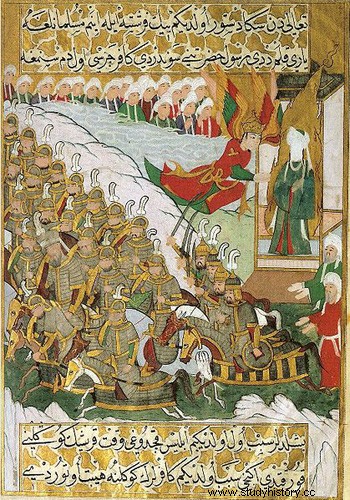
EN 624:The Battle of Al Badr:
A Meccan army attacks Medina. Mohammed and his followers are outnumbered but fight bravely and win . According to the Koran, it is thanks to the support of a divine army of 3,000 angels that they achieve victory. The triumphant troops return to Medina and are greeted with enthusiasm.
Beginning of the open conflict between part of the Jews of Medina and the Muslims:
After this victory , in Arabia, many are converting to Islam and this does not please some Medinans, in particular the tribe of Banu Qaynuqa . They come into conflict with the Muslims, while the other 2 tribes do not help them. Muhammad banished them giving them time to settle their affairs. He leaves them their dromedaries, weapons, etc. Then Muhammad comes into conflict with the Banu Nadir tribe. and bans them also. Only the Banu Qurayza Jewish tribe remains. who are in turn accused of having betrayed the alliance with Muhammad. A joint arbitrator, determined by the two parties, decides that the women and the children of the tribe will be sold as slaves and that men adults will be executed . These practices were very common at that time during times of war.
BETWEEN 625 AND 629:Muhammad conquers the oasis of Khaybar (or Khaïbar)
This is where the Banu Nadir took refuge whom Muhammad banished of Medina. Both farmers and warriors, they built a veritable fortress, as rich as it was impregnable, but after a long siege, Mohammed takes the victory and decides the fate of the vanquished. The Banu Nadir offer to Mohammed to spare them and let them practice their religion in exchange for a tax . Mohammed accepts this deal which gives him a great source of wealth .
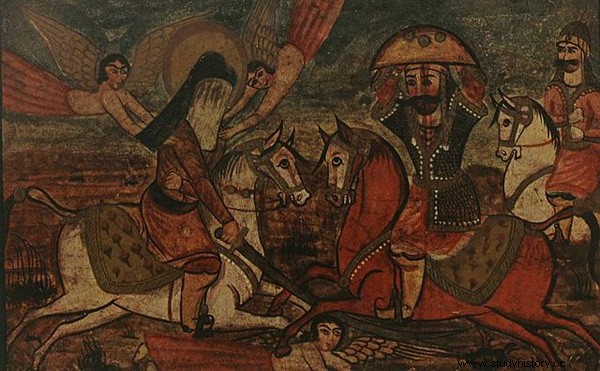
Many Jewish tribes fall under Muslim rule:
At the end of each victory and even without a fight, treaties of the same type are concluded and the Jewish and Christian tribes fall under the dominion Muslim. The generalization of these treatises gives rise to the status of the dhimma which in Arabic means submission and protection . When someone joins a tribe that is not his own, he is protected in exchange for a tax and this automatically induces an inferior status. Subjugated peoples are often forbidden to ride horses and carry swords or weapons. It is in fact a purely military prohibition in order to prevent them from fighting.
AD 630:Muhammad and his followers conquer Mecca and recapture the Kaaba
For Muslims, the kaaba of Mecca was built by Ibrahim and his son Ishmael and they wish to take back this place which the Meccan polytheists have desecrated by installing their multiple divinities there. Discouraged by the successive incursions of Muhammad and the growing number of conversions to Islam, the Meccans surrender without a fight. Mohammed immediately goes to the Kaaba and destroys the idols . Then, the rites of the pilgrimage Muslim replace those of the pagans , Mecca becomes the holy city Muslims and the Kaaba the “House of God “.
BETWEEN 630 AND 631:Birth of the Islamic religion
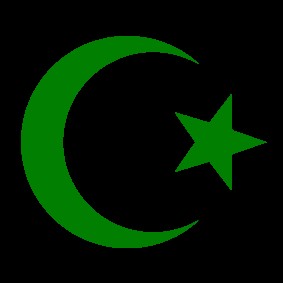
Islam forges a new personality and becomes a new religion in its own right:
Muhammad's influence is growing in the Arabian Peninsula. Rid of his main adversaries, the Madinans and the rabbis who refused to see him as the new prophet and who rejected his divine message, Muhammad decided to move away from certain practices borrowed from Judaism and to forge his own religion. This marks a major turning point in the history of Islam. However, the initial message that Muhammad wanted to state was very close to Jewish monotheism and was greatly inspired by the Torah.
Every Muslim is bound by 5 obligations, also called “pillars” or arkan:
– The Profession of Faith (shahada , or testimony):Pronounced 3 times immediately, it constitutes the act of conversion of Islam and expresses himself thus “There is only God and Muhammad is the messenger of God “.
– Prayer (salad ):The kibla , i.e. the direction of prayer , changes. God now commands to pray 5 times a day and no longer 3 as for the Jews, and no longer orient towards Jerusalem, but towards Mecca .
– Almsgiving (zakat , or sadaqa ):This is a tax monks paid by the rich.
– The pilgrimage (haji ):The Muslim must go to Mecca at least once in your life.
– Fasting (sawm ):This is a very important pillar of Islam. It is obligatory for any pubescent Muslim during the 9th month of Ramadan , and no longer in Kipur like the Jews:It is forbidden to eat, drink, smoke, have sexual intercourse, from sunrise to sunset.
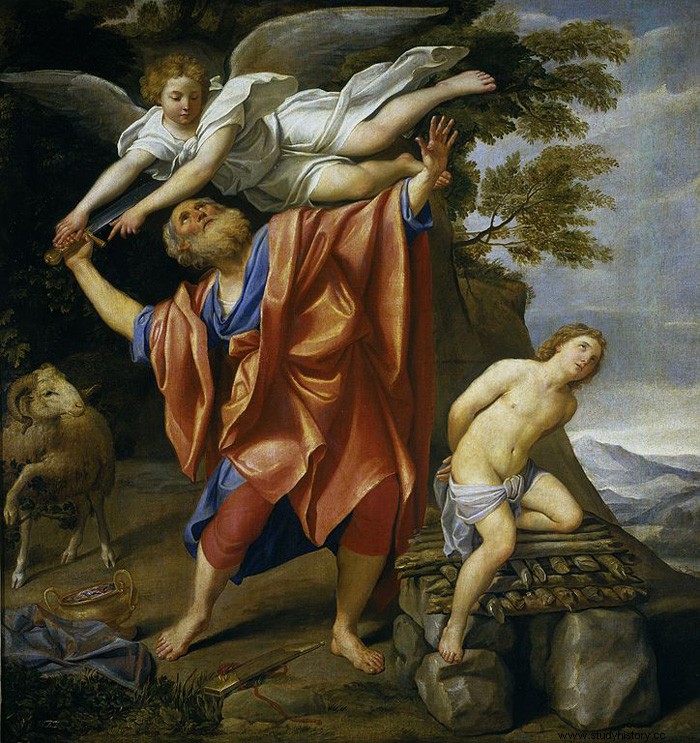
The story of Abraham, Ishmael and Isaac:
Abraham and his sons Ishmael and Isaac is a subject of disagreement between Jews and Muslims :
– In the Thora , Abraham is a major figure and the Jews regard him as the father of Judaism. He and his wife Sarah are aging without issue. Then Abraham decides to have a child, Ishmael, with Agaar, his wife's Egyptian servant. But at age 99, through divine intervention, Abraham finally has a child, Isaac, from his wife Sarah. Jealous, Sarah demands the departure of Ishmael and Agaar. God then puts Abraham's liver to the test by asking him to sacrifice his son Isaac. Abraham is about to slaughter his son when God stops his arm and grants him the sacrifice of a ram instead of Isaac.
– In Islamic tradition , the story is not quite the same:Abraham is called Ibrahim and he is considered the ancestor of the Arabs, the patriarch par excellence, the main prophet of Islam, the first Muslim and the first to submit to the one god. The son he is about to sacrifice is not Isaac but Ishmael, the son of Agaar the Egyptian. For the Arabs, having an ancestor like Ishmael means being part of a people also blessed by God. This is why Muhammad justified this change, so as not to leave the Jews the monopoly of the “chosen people”.
EN 632:Death of Muhammad
Mohamed falls ill and dies. The influence of Islam is then limited to Arabia . His close companions designate a caliph , that is to say a substitute for the Prophet on earth. The very first is his closest companion, Abû Bakr .
EN 632:Death of Abu Bakr
He reigns only 2 years before turning off.
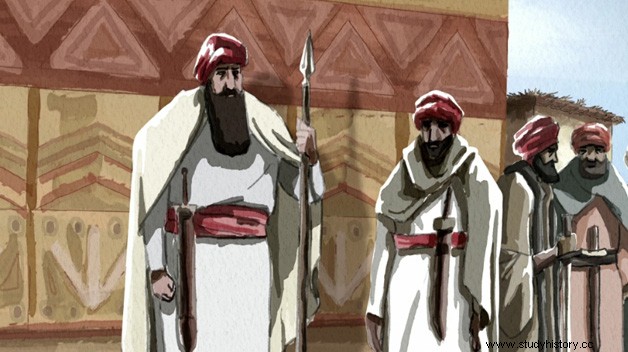
Hajj pilgrimage:
This pilgrimage corresponds to the 5th pillar of Islam. It takes place during the lunar month of Dhû al-hijja , who corresponds to the 12th month of the Muslim calendar. Between the 8th and 13th of this month, every Muslim must piously repeat the gestures of the Prophet Muhammad:
– The 8th of the month :The pilgrim enters the state of Ihram and is sacred after repeating the ritual formula 3 times. Then he goes to the Masjid al-Haram mosque for the prayer (salad) midday. Then, draped in 2 pieces of seamless white fabric, symbolizing the purity and equality of believers before God, the pilgrim performs a circumambulation around the Kaaba. He circles around it 7 times, keeping it on his left. Then, the pilgrim performs 7 races 420 meters between the hills of Safâ and Marwah, in memory of Hagar's wanderings in search of a source of water to quench her son Ishmael's thirst. Finally the pilgrim drinks at the Zamzam source , then go to Mina , 4 km from Mecca to make the prayers afternoon, evening and the following morning.
– The 9th of the month :The devotee heads for Mount Arafat (20 km) and pray to God from noon to sunset repeating “Here I am before you, Allah “. Then it goes to Muzdalifa to pray there and pick up stones for the stoning the next day.
– The 10th of the month :After the morning prayer, begins the 1st day of the sacrifice and stoning . The pilgrim returns to Mina then walks the 300 meters that separate him from the place where Ibrahim took his son Ishmael to sacrifice him. On his journey, he encounters 3 pillars which symbolize the 3 points where Iblis (a disbelieving angel who personifies evil and temptation) tried to divert Abraham from his divine mission. The pilgrim stones these pillars with pebbles picked up the day before. In the meantime, the pilgrim must sacrifice an animal as an offering, which symbolizes the ram that Ibrahim sacrificed in place of his son. A camel or a cow can be sacrificed by 7 people , while a goat can only be sacrificed by 1 person . Performing a sacrifice alone is better than associating with other people. It is preferable that the faithful do not neglect the slaughter of animals intended for sacrifice, if they are able, because this makes it possible to liberate his consciousness and it is a very important glorification, worship and remembrance of Allah. Then the pilgrim eats part of the animal, but the rest must be given to the poor or paid as an offering to a bank run by the local authorities. Finally, the faithful must redo the rites of “circumambulation of the return ”:Turn around the kaaba, do the 7 steps between Safâ and Marwah, then drink at the source Zamzam .
– The 11th and 12th of the month :The stoned pilgrim the 3 stelae of Mina representing Satan , first the smallest, then the medium and finally the largest, by throwing 7 pebbles on each and saying “Allah is the greatest “. Between 2 stelae, he faces Mecca and recites a few invocations. Finally, before leaving, the male pilgrim shaves his head and the female shortens the length of her hair.
This pilgrimage allows atonement and remission great and small sins in accordance with the word of Muhammad:
"Whoever makes the pilgrimage without having sexual intercourse and without committing a great sin is released from his sins and becomes again like the day his mother gave birth to him .
The Islamic doctrine:
Every Muslim must believe in angels (who have no sex), to the prophets (who are superior to the angels and who are sent by God to reveal or recall the religion), to the books revealed and at the last judgment . The sunna (tradition) is a collection of lessons, obligations or recommendations related to the actions of the Prophet Muhammad:For example, the wearing of the veil is not mandatory, but simply recommended to the wives of Muhammad. Precious jewels are forbidden to men, but not perfumes, of which the prophet is a great lover. Wine and alcohol are prohibited and the drinker of these drinks will receive 80 lashes. These lessons are followed by the most pious Muslims wishing to imitate Muhammad.
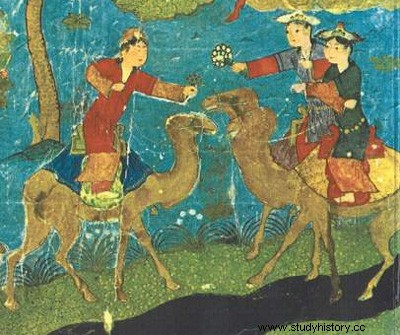
The Quran:
The Quran represents for all Muslims the sacred text par excellence:He is the word of God become a book. After numerous oral and written transmissions on flat stones, camel shoulder blades or pieces of leather, it was only in 652 AD that the Caliph Uthman, 3rd successor of Mohammed, gives the order to bring together all the texts to make a definitive version . The Quran is made up of 114 suras (chapters), themselves divided into 6,243 verses . For example, in the Koran we find Noah, Abraham (Ibrahim), Moses (Moussa), David (Daoud), Solomon (Soliman), Joseph (Yousef), Jonas (Younès), Elie (Elias), Jesus (Issa, or Aissa), etc. Jesus is considered a great prophet because he performed miracles, but for Islam he is not the son of God and did not die on the cross. For them, it is Muhammad who was sent by God to restore these truths. The Quran also addresses the issue of the Last Judgment :God's creatures will be naked, standing before him, scorched by the sun. The good ones will go to heaven and the others will be condemned to the eternal fire of hell . The chosen ones of paradise will have a multitude of houris at their disposal :Young virgins of incredible beauty (“like rubies and pearls” – sura 55). They rest on green cushions and the finest carpets, in gardens that are always cool and well irrigated. The Koran forbids the reproduction of the human figure, so it was late, outside the Arab world, that the first representations of Mohammed were made.
Islamic law or Sharia :
Classify the activities people in 5 categories :Authorized, recommended, obligatory, detestable, prohibited. For example, marriage is a duty and the Koran allows a man to have 4 wives. 100 lashes are given to the culprit of adultery, 80 to the detractor of false accusations. However, some countries have retained the ancient custom of stoning, and in case of theft, the Koran orders the hand of the culprit to be cut off. Any good Muslim should not eat pork, or meat from an animal that has already died that has not been slaughtered to be emptied of its blood.
Personal notes regarding various sources found on the internet:
For Muslims, about 600 years after the departure of Jesus Christ (Issa), people were immersed in darkness because they had forgotten God. Allah did not send a new messenger on earth, people had become polytheists again and they made idols to worship the gods of trees, sea, sun, moon, etc. Le monde était plongé dans l’égarement et la perdition car ils consommaient des boissons alcoolisées, s’adonnaient aux jeux de hasard, aux plaisirs de la chair, enterraient leurs filles vivantes, brûlaient vives les veuves (Note personnelle : Peut être que la mère de Mohammed, veuve à la naissance de son fils, fut brûlée), etc.
Certaines sources parlent également de signes (comme il y en eu pour Alexandre le Grand ) :Lors de la naissance de Mohammed, des événements auraient eu lieu à travers le monde :Par exemple, le palais de l’empereur de Perse trembla et un feu qui était allumé depuis des siècles dans un de leurs temples s’éteignit.
